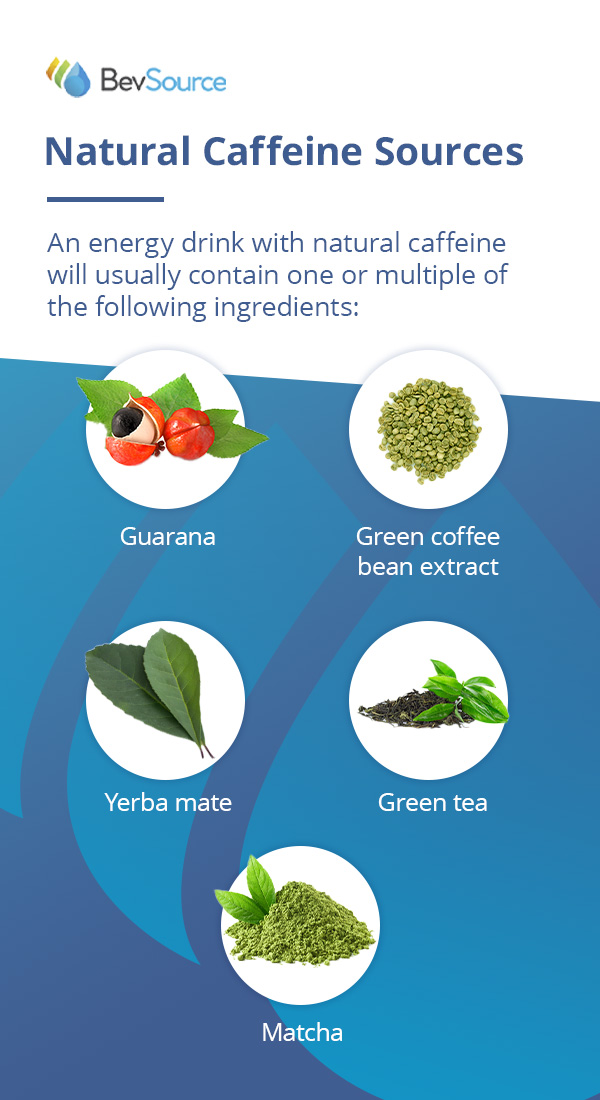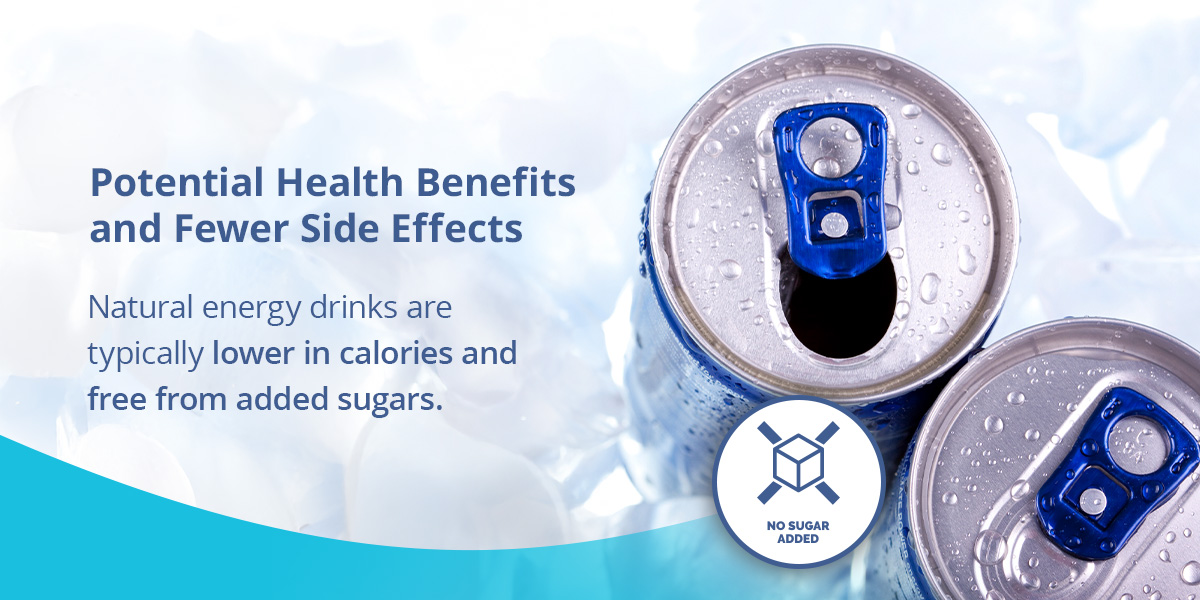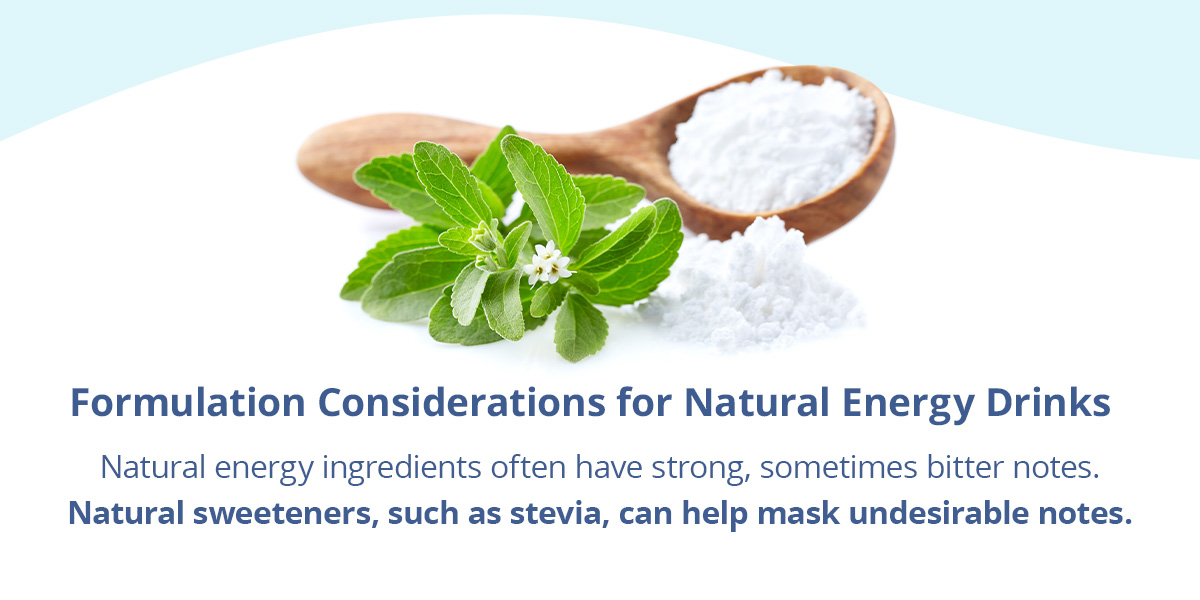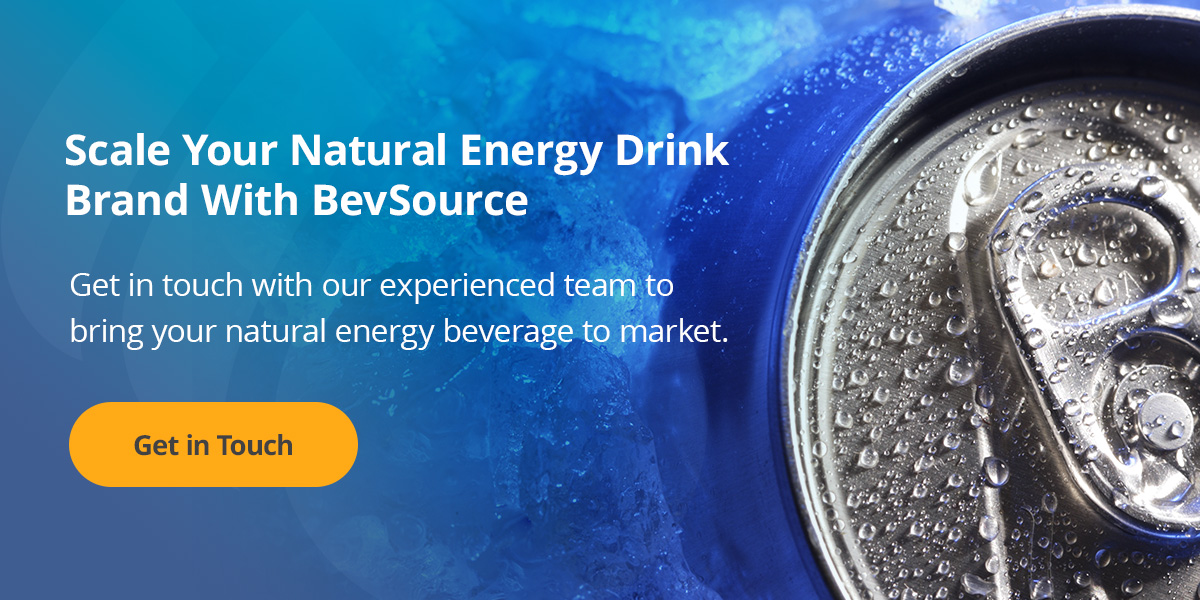Natural Energy Drinks: Key Ingredients, Benefits and Formulation Considerations

Energy drinks are functional beverages designed to provide a quick boost of energy and alertness. Conventional options typically contain synthetic caffeine, high amounts of sugar, artificial flavors or colors, and additives like vitamins and amino acids.
So, what are natural energy drinks, and how are they different?
Unlike conventional options, natural energy drinks rely on naturally sourced caffeine, plant-based sweeteners and simple, recognizable ingredients. This clean-label approach reflects a broader shift in consumer priorities. As wellness becomes a way of life and more people emphasize balanced diets, quality sleep and holistic health, the energy drink market is evolving. Natural energy drinks offer a compelling solution — sustained energy with peace of mind that beverages support both productivity and overall well-being.
Consumer Trends Driving Demand for Natural Energy Drinks
The demand for natural energy drinks is driven by several consumer trends that reflect a broader shift toward health and wellness, particularly among younger demographics like millennials and Gen Z. Here are the main trends influencing the natural energy drink market:
- Focus on health and wellness: An increased awareness of the negative effects of excessive sugar and artificial additives has led many consumers to prefer natural energy drinks. Positioned as a “cleaner” alternative, natural energy drinks deliver a functional boost without compromising health goals.
- Lifestyle alignment: Active and busy lifestyles — whether driven by fitness, work, parenting or travel — create ongoing demand for convenient energy solutions that still support overall wellness goals. Products enriched with vitamins, electrolytes and natural ingredients appeal to everyday fitness enthusiasts and athletes who want functional benefits but also care about what they're putting in their bodies.
- Sustained energy over stimulant highs: There's growing demand for beverages that provide a steady, natural energy boost without the jitters or crashes associated with conventional energy drinks. Naturally sourced caffeine is perceived as gentler and more balanced.
- Growing gaming culture: The gaming and esports community has impacted energy drink preferences. Increased attention to cognitive health and focus, especially among students, professionals, gamers and the esports community, is leading consumers to seek energy drinks that are stimulating and also support mental clarity without negative side effects.
- Sleep health awareness: As consumers become more focused on sleep health, there is a growing interest in energy drinks that balance energy-boosting properties with lower caffeine levels. This trend encourages brands to innovate and offer options that cater to consumer needs for energy without disrupting sleep cycles.
Key Ingredients in Natural Energy Beverages
Natural energy drinks contain ingredients derived from natural raw materials that provide energy without the downsides associated with conventional energy drinks. Here are some ingredients commonly found in these beverages.
1. Natural Caffeine Sources
Natural caffeine energy drinks stimulate alertness and energy levels without the harsh side effects often associated with synthetic caffeine. An energy drink with natural caffeine will usually contain one or multiple of the following ingredients:

- Guarana: A climbing plant native to the Amazon, guarana may boost energy, improve mental performance and aid in weight loss.
- Green coffee bean extract: This extract comes from unroasted coffee beans and is rich in chlorogenic acid, which has antioxidant properties. It offers a milder caffeine source compared to roasted coffee.
- Yerba mate: Yerba mate leaves contain caffeine and may provide a balanced energy boost that enhances mental clarity and focus. Traditionally used in South America to brew tea, yerba mate is now incorporated in canned beverages, such as CLEAN's yerba mate collection.
- Green tea: Green tea contains caffeine and L-theanine, which may support relaxation and improve sleep.
- Matcha: Matcha, a finely ground powder of green tea leaves that contains antioxidants and phytochemicals, is a popular choice in coffee shops for its vibrant color, earthy flavor and perceived health benefits. However, it's less common in ready-to-drink (RTD) energy drinks due to its lower caffeine potency, stronger taste and higher cost compared to other sources like green tea extract.
2. Adaptogens
Adaptogens are natural substances that are believed to help the body adapt to stress and promote balance. The following ingredients may enhance mental and physical performance:
- Ashwagandha: A medicinal herb used in Ayurvedic and Unani medicine, ashwagandha may help reduce cortisol levels, which can improve energy and focus.
- L-theanine: L-theanine is valued for its ability to promote relaxation and reduce anxiety without causing drowsiness. When combined with caffeine — as in green tea or matcha — it helps improve focus and attention, delivering a smoother energy experience without jitters or crashes. While not classified as an adaptogen in the traditional scientific sense, it is sometimes marketed as one based on its stress-relieving effects.
- Reishi mushroom: These mushrooms may support immune function and reduce fatigue.
- Lion's mane: Lion's mane is purported to improve cognitive function and mood.
- Ginseng: Ginseng is a root that may boost energy, improve cognitive function and reduce fatigue. It may also improve heart health and support immune function.
- Rhodiola rosea: An adaptogenic herb that grows in cold regions, Rhodiola is believed to help the body adapt to stress. It can also reduce fatigue and enhance mental performance.
3. Vitamins and Minerals
Vitamins and minerals can help boost energy by supporting energy production processes in the body, making them essential components of natural energy drinks. Common vitamins and minerals include:
- B vitamins: This group of vitamins, in particular B6 and B12, is important for energy metabolism. They help convert carbohydrates, fats and proteins into energy. B vitamins may also support brain health and immunity.
- Vitamin C: Vitamin C is a potent antioxidant that plays a role in metabolic processes and helps protect cells from oxidative stress, which can be heightened during physical activity or periods of high energy demand. As an antioxidant, vitamin C also provides additional health benefits, such as supporting the immune system.
- Vitamin D: Vitamin D is often included to support cellular energy production and reduce fatigue. It is also marketed as providing other wellness benefits, including supporting mood regulation and immune function. Vitamin D3 comes from animal-based sources, while vitamin D2 comes from plants and is ideal for vegetarians and vegans.
- Magnesium: Magnesium is increasingly included in energy drinks due to its essential role in a wide range of functions that directly support energy, performance and recovery. Its role as a critical electrolyte and cofactor in energy metabolism makes it especially valuable for those seeking sustained energy and optimal performance during physical activity. Magnesium is beneficial for muscle function and recovery, including the prevention of cramps.
4. Herbal and Botanical Ingredients
Ingredients from plants provide various potential benefits, including energy enhancement and improved stamina. Here are some to consider:
- Maca root: Maca is a root vegetable native to the Andes. This root is believed to boost energy and enhance stamina. Maca is also rich in vitamins and minerals.
- Ginger: Ginger is a popular herb known for its anti-inflammatory and antioxidant properties. Ginger can improve digestion, help with bloating and relieve nausea.
- Turmeric: Turmeric contains curcumin, which also has anti-inflammatory and antioxidant properties.
5. Natural Sweeteners
Natural sweeteners are a key part of the appeal of natural energy drinks. These alternatives to refined sugar are used to provide sweetness with fewer calories, a lower glycemic impact and a more "natural" ingredient deck. Some of the most popular natural sweeteners include:
- Stevia: Stevia is a zero-calorie, plant-based sweetener with a high sweetness intensity. It’s heat-stable and widely recognized, and it doesn’t spike blood sugar.
- Monk fruit: This is a popular choice for its clean taste profile and lack of impact on blood sugar. Monk fruit is often used in conjunction with other natural sweeteners.
- Erythritol: Erythritol adds bulk and mouthfeel and is often paired with stevia or monk fruit. It's zero-calorie, does not affect blood sugar and has a mild taste.
- Fruit juices: Fruit juices are another common natural sweetening and flavoring option in natural energy drinks. They're often used to provide a more wholesome, recognizable source of sweetness along with added nutrients.
Benefits of a Natural Energy Drink
Natural energy drinks offer a range of potential benefits that make them appealing to health-conscious consumers.
1. Potential Health Benefits and Fewer Side Effects

Derived from naturally sourced caffeine like green tea or guayusa, these drinks often provide a more balanced, sustained boost without the jittery spikes or crashes associated with synthetic caffeine. Natural energy drinks are also typically lower in calories and free from added sugars. Many natural plant-based sweeteners also have a lower glycemic impact, so they do not affect blood sugar levels.
Natural formulations frequently include adaptogens and stress-relieving herbs that support focus and resilience to stress, as well as vitamins that aid energy metabolism and cognitive function.
2. Cognitive Function and Mental Clarity Support
Natural caffeine, especially when combined with L-theanine, can boost mood, support a relaxed state of mind and improve various aspects of brain function without the jitters or crashes typical of synthetic caffeine.
Adaptogens can help the body manage stress while enhancing cognitive performance. These ingredients are ideal for busy professionals and college students.
3. Consumer Perceptions of Effectiveness
Many consumers believe natural energy drinks provide a smoother, more sustainable energy lift without the crash often associated with synthetic caffeine and excess sugar. With added adaptogens, nootropics and botanicals, natural options are seen as supporting mental clarity, stress resilience or mood, not just physical energy.
Consumers want to know exactly what they’re putting into their bodies, especially when it comes to energy-boosting products. Natural energy drink brands often lead with clear labels, listing recognizable ingredients and avoiding vague terms like “proprietary blend.” Transparency reinforces a brand’s commitment to clean, simple and minimally processed formulations.
Formulation Considerations for Natural Energy Drinks

As a natural energy beverage company, here's how you can ensure that your final product meets consumer expectations:
- Balancing taste and flavor: Natural energy ingredients often have strong, sometimes bitter notes that can be challenging to balance. With a growing demand for reduced sugar and no artificial sweeteners, developing appealing flavors becomes more complex.
- Sweeteners: Natural sweeteners, such as stevia, can help mask undesirable notes and develop a more palatable product.
- Ingredient transparency: Consumers want transparency regarding what's in their beverages. Clear labels and Nutrition Facts Panels highlighting natural ingredients and their potential benefits can enhance trust and acceptance. Products free from artificial additives and preservatives are also more appealing to health-conscious consumers.
- Customization and use occasion: As consumer preferences evolve, you'll find that customers will look for options that cater to specific needs, such as pre-workout energy, study aids or general vitality. Formulating products with targeted benefits can help meet these diverse consumer demands.
Market Innovations and Trends in Natural Energy Drinks
The market for natural energy drinks is driven by changing consumer preferences and advancements in formulation. Here's what a natural energy drink company can expect:
- Sustainable sourcing and packaging: Brands will increasingly focus on sourcing ingredients from sustainable and ethical suppliers. Transparency in sourcing practices will be a key selling point, as consumers want to know where ingredients come from. Sustainable packaging solutions, such as biodegradable or recyclable materials, also appeal to environmentally conscious customers.
- Personalization and customization: Personalized subscription services that deliver tailored energy drink options based on individual preferences and health goals may become more popular.
- Innovative sweeteners and flavorings: Advanced natural sweeteners, such as improved stevia formulations and monk fruit, will continue to grow, allowing brands to optimize low-sugar or sugar-free beverages without compromising taste. Brands may also experiment with fruit extracts, herbs and spices to enhance flavor and overall health appeal.
- Students and gamers: Brands will continue to target younger demographics, particularly gamers and students, with products designed to enhance focus, reaction time and cognitive performance.
Regulatory Considerations for Natural Energy Drinks
The rules for natural beverages are fairly straightforward. To be classified as a natural beverage, your beverage must follow FDA regulations. The term "natural" means “nothing artificial or synthetic (including all color additives regardless of source) has been included in, or has been added to, a food that would not normally be expected to be in that food.”
When it comes to the panel, the FDA has the following requirements:
- Panels: Beverages must include a Nutrition Facts Panel (NFP) that provides information on nutritional content. Liquid supplements must have a Supplement Facts Panel (SFP), which lists all ingredients with proven or purported nutritional value.
- Ingredient listing: NFPs include all ingredients in descending order of predominance. This includes any natural ingredients, sweeteners and flavorings used in the formulation. SFPs only list nutrients when they are present in measurable amounts.
- Health claims: Any health claims made on the label must be substantiated and comply with FDA regulations. For example, claims about the benefits of specific ingredients must be supported by scientific evidence.
The FDA does not set a specific limit on caffeine content in beverages, but it does monitor caffeine levels in energy drinks. Brands must ensure that caffeine levels do not pose a risk to consumers.
Marketing Strategies for Natural Energy Drinks
Larger beverage companies benefit from using existing resources and established customer loyalty to market themselves. If you're a new natural energy drink company or a smaller brand entering the market, you'll need to find a way to stand out in this competitive market. Here are some strategies to consider:
- Focus on lifestyle: Identify your primary target audience. Are they athletes, students, busy professionals, gamers or wellness enthusiasts? Position your natural energy drink brand as a solution for specific lifestyle needs, such as enhancing productivity for busy professionals or providing sustained energy for athletes.
- Target a specific need: Don't try to be everything to everyone. Instead, define the specific occasions or needs your product addresses, whether it's a pre-workout drink to boost energy and performance or a midday energy boost to combat fatigue. Is your product perhaps an alternative to coffee, or a recovery drink to replenish nutrients and aid muscle recovery post-exercise?
- Define your unique selling proposition (USP): Differentiate yourself by emphasizing unique selling points of your products, such as organic ingredients, low-calorie options or sustainability credentials. While “natural” is a good starting point, it's becoming a given. Highlight unique, scientifically backed natural ingredients like adaptogens for stress resilience and nootropics for focus. Explain how these ingredients provide energy and additional benefits. Emphasize ethical sourcing, organic certification or sustainable practices, and clearly communicate any “free from” claims.
- Use social media and influencer marketing: Use social media platforms to share engaging content, such as recipes, workout tips and lifestyle hacks. This strategy promotes the product while positioning your brand as a valuable consumer resource. You can also collaborate with influencers in the health, fitness and gaming communities. Influencers can post authentic content that showcases the benefits of natural energy drinks to help build trust and brand loyalty.
- Experiential marketing or sampling: Engage your target consumers by reaching them when and where they are most likely to enjoy your drink. Consider sponsoring local fitness events, gaming tournaments or community gatherings to create brand visibility. Additionally, set up sampling stations along busy walking trails or in high-traffic areas to offer free samples. This approach introduces potential customers to your product while creating memorable brand experiences.
- Expand distribution: While supermarkets are currently the primary distribution channels, consider alternative channels, such as gyms and fitness studios or health food stores. You can also use the direct-to-consumer (DTC) model. This strategy will increase accessibility and allow your brand to reach a broader audience. Implement sampling campaigns in various retail settings to introduce consumers to your products.
Scale Your Natural Energy Drink Brand With BevSource
As consumers increasingly seek natural alternatives to conventional energy drinks, you have the opportunity to develop products that meet these preferences. Every beverage starts with an idea. But it also involves careful consideration of formulation, manufacturing, regulatory compliance and market positioning. Ingredient selection and formulation are the heart and foundation of the product.
At BevSource, we connect our clients with the right developers, formulators and manufacturers. With more than 20 years of successfully propelling startups and scaling beverage brands, we share our relationships and expertise to accelerate your growth.
Get in touch with our experienced team to bring your natural energy beverage to market.

